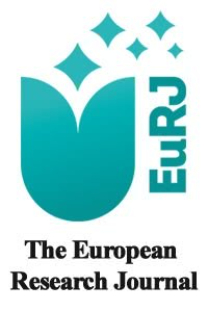The role of myocardial perfusion imaging in the identification of the obstructive coronary artery lesions: a tertiary cardiology center experience
The role of myocardial perfusion imaging in the identification of the obstructive coronary artery lesions: a tertiary cardiology center experience
___
- 1. World Health Organization, Top 10 causes of death. http://www9.who.int/gho/mortality_burden_disease/causes_deat h/top_10/en/
- 2. Detrano R, Gianrossi R, Froelicher V. The diagnostic accuracy of the exercise electrocardiogram: a metaanalysis of 22 years of research. Prog Cardiovasc Dis 1989;32:173-206.
- 3. Candell-Riera J, Santana-Boado C, Castell-Conesa J, AguadéBruix S, Olona-Cabases M, Domingo E, et al. Culprit lesion and jeopardized myocardium: correlation between coronary angiography and single-photon emission computed tomography. Clin Cardiol 1997;20:345-50.
- 4. Knuuti J, Wijns W, Saraste A, Capodanno D, Barbato E, Funck-Brentano C, et al. 2019 ESC Guidelines for the diagnosis and management of chronic coronary syndromes. Eur Heart J 2020;41:407-77.
- 5. Williams B, Mancia G, Spiering W, Rosei EA, Azizi M, Burnier M, et al; ESC Scientific Document Group. 2018 ESC/ESH Guidelines for the management of arterial hypertension: The Task Force for the management of arterial hypertension of the European Society of Cardiology (ESC) and the European Society of Hypertension (ESH). Eur Heart J 2018;39:3021-104.
- 6. Cosentino F, Grant PJ, Aboyans V, Bailey CJ, Ceriello A, Delgado V, et al. 2019 ESC Guidelines on diabetes, pre-diabetes, and cardiovascular diseases developed in collaboration with the EASD: The Task Force for diabetes, pre-diabetes, and cardiovascular diseases of the European Society of Cardiology (ESC) and the European Association for the Study of Diabetes (EASD). Eur Heart J 2020;41:255-323.
- 7. Schuijf JD, Wijns W, Jukema JW, Atsma DE, de Roos A, Lamb HJ, et al. Relationship between noninvasive coronary angiography with multi-slice computed tomography and myocardial perfusion imaging. J Am Coll Cardiol 2006;48:2508-14.
- 8. Gibson CM, Cannon CP, Daley WL, Dodge JT Jr, Alexander B Jr, Marble SJ, et al. TIMI frame count: a quantitative method of assessing coronary artery flow. Circulation 1996;93:879-88.
- 9. Verberne HJ, Acampa W, Anagnostopoulos C, Ballinger J, Bengel F, De Bondt P, et al; European Association of Nuclear Medicine (EANM). EANM procedural guidelines for radionuclide myocardial perfusion imaging with SPECT and SPECT/CT: 2015 revision. Eur J Nucl Med Mol Imaging 2015;42:1929-40.
- 10. Cerqueira MD, Weissman NJ, Dilsizian V, Jacobs AK, Kaul S, Laskey WK, et al; American Heart Association Writing Group on Myocardial Segmentation and Registration for Cardiac Imagin. Standardized myocardial segmentation and nomenclature for tomographic imaging of the heart. A statement for healthcare professionals from the Cardiac Imaging Committee of the Council on Clinical Cardiology of the American Heart Association. Int J Cardiovasc Imaging 2002;18:539-42.
- 11. IAEA Human Health Series No. 23 (Rev 1) Nuclear Cardiology: Guidance on the Implementationof SPECT Myocardial Perfusion Imaging International Atomic Agency, Vienna; 2016.
- 12. Vrints CJ. Refined interpretation of exercise ECG testing: Opportunities for a comeback in the era of expanding advanced cardiac imaging technologies? Eur J Prev Cardiol 2016;23:1628- 31.
- 13. National Clinical Guideline Centre for Acute and Chronic Conditions (UK). Chest Pain of Recent Onset: Assessment and Diagnosis of Recent Onset Chest Pain or Discomfort of Suspected Cardiac Origin [Internet]. London: Royal College of Physicians (UK); March 2010.
- 14. Rieber J, Huber A, Erhard I, Mueller S, Schweyer M, Koenig A, et al. Cardiac magnetic resonance perfusion imaging for the functional assessment of coronary artery disease: a comparison with coronary angiography and fractional flow reserve. Eur Heart J 2006;27:1465-71.
- 15. Pellika PA, Nagueh SF, Elhendy AA, Kuehl CA, Sawada SG, American Society of Echocardiography. American Society of Echocardiography recommendations for performance, interpretation, and application of stress echocardiography. J Am Soc Echocardiogr 2007;20:1021-41.
- 16. Hasbek Z, Ertürk SA, Çakmakçılar A, Gül İ, Yılmaz A. Evaluation of myocardial perfusion imaging SPECT parameters and pharmacologic stress test with adenosine versus coronary angiography findings: are they diagnostically concordant? Mol Imaging Radionucl Ther 2019;28:53-61.
- 17. Yao Z, Liu XJ, Shi RF, Dai R, Zhang S, Liu YZ, et al. A comparison of 99Tcm-MIBI myocardial SPET and electron beam computed tomography in the assessment of coronary artery disease in two different age groups. Nucl Med Commun 2000;21:43-8.
- 18. Gonzalez P, Massardo T, Jofre MJ, Yovanovich J, Prat H, Munoz A, et al. 201Tl myocardial SPECT detects significant coronary artery disease between 50% and 75% angiogram stenosis. Rev Esp Med Nucl 2005;24:305-11.
- 19. Johansen A, Hoilund-Carlsen PF, Christensen HW, Vach W, Jorgensen HB, Veje A, et al. Diagnostic accuracy of myocardial perfusion imaging in a study population without post-test referral bias. J Nucl Cardiol 2005;12:530-7.
- 20. Schepis T, Gaemperli O, Koepfli P, Namdar M, Valenta I, Scheffel H, et al. Added value of coronary artery calcium score as an adjunct to gated SPECT for the evaluation of coronary artery disease in an intermediate-risk population. J Nucl Med 2007;48:1424-30.
- 21. Jeetley P, Hickman M, Kamp O, Lang RM, Thomas JD, Vannan MA, et al. Myocardial contrast echocardiography for the detection of coronary artery stenosis: a prospective multicenter study in comparison with single-photon emission computed tomography. J Am Coll Cardiol 2006;47:141-5.
- 22. Udelson JE, Dilsizian V, Bonow RO. Nuclear Cardiology. In: Eugene Braunwald, eds. Braunwald’s Heart Disease a Textbook of Cardiovascular Medicine. PA, Elsevier Inc.; 2015:271-316.
- ISSN: 2149-3189
- Yayın Aralığı: 6
- Başlangıç: 2015
- Yayıncı: Prusa Medikal Yayıncılık Limited Şirketi
A compelling case of postpartum symmetrical peripheral gangrene
Retrospective review of children with vertigo: a 3-year experience
Arzu Ekici, Muhammet Furkan Korkmaz
Shabnam FATALİZADE, Salih Saygın EKER
Comparison of neuroprotective effect of isoflurane and sevoflurane on cerebral ischemia
Vuslat Mutlu Erdem, Halil Erkan Sayan, Şefika Gülsen Korfalı
Selma ARI, Hasan ARİ, Veysi CAN, Sencer ÇAMCI, Mehmet MELEK
Nalan Ogan, Tuba Çandar, Meral Gülhan, Aslıhan Alhan, Togay Evri
Efe Önen, Mustafa Murat Aydos, İdris Nas
